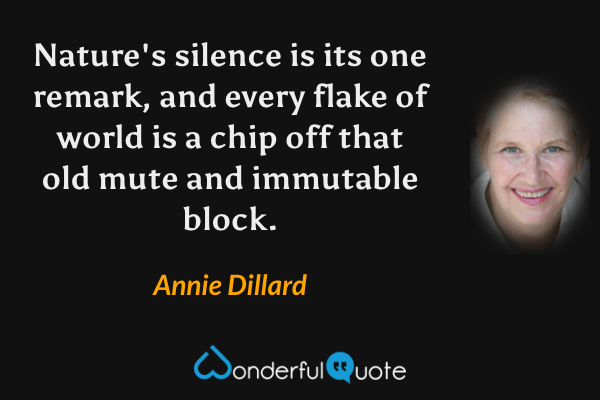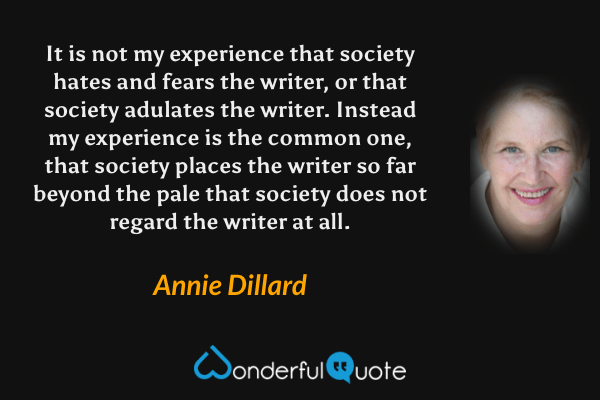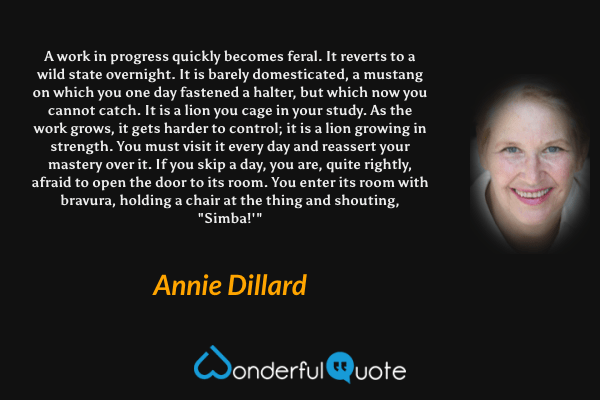Annie Dillard Quotes
Most popular Annie Dillard Quotes

You can't test courage cautiously.

How we spend our days is, of course, how we spend our lives.

Art is like an ill-trained Labrador retriever that drags you out into traffic.

We are most deeply asleep at the switch when we fancy we control any switches at all.

The chief danger memoirists face is starring in their own stories, and becoming fascinated.

Why do people in churches seem like cheerful, brainless tourists on a packaged tour of the Absolute?

Nature's silence is its one remark, and every flake of world is a chip off that old mute and immutable block.

Every book has an intrinsic impossibility, which its writer discovers as soon as his first excitement dwindles.

Appealing workplaces are to be avoided. One wants a room with no view, so imagination can meet memory in the dark.

If you aim for the wood, you will have nothing. Aim past the wood, aim through the wood; aim for the chopping block.

One of the few things I know about writing is this: spend it all, shoot it, play it, lose it, all, right away, every time.

The universe was not made in jest but in solemn incomprehensible earnest. By a power that is unfathomably secret, and holy, and fleet.

You have to take pains in a memoir not to hang on the reader's arms, like a drunk, and say, "And then I did this and it was so interesting."

A schedule defends from chaos and whim. It is a net for catching days. It is a scaffolding on which a worker can stand and labor with both hands at sections of time.

Poetry has been able to function quite directly as human interpretation of the raw, loose universe. It is a mixture, if you will, of journalism and metaphysics, or of science and religion.

An Inuit hunter asked the local missionary priest: 'If I did not know about God and sin, would I go to hell?' 'No,' said the priest, 'not if you did not know.' 'Then why,' asked the Inuit earnestly, 'did you tell me?'

It is not my experience that society hates and fears the writer, or that society adulates the writer. Instead my experience is the common one, that society places the writer so far beyond the pale that society does not regard the writer at all.

Every morning you climb several flights of stairs, enter your study, open the French doors, and slide your desk and chair out into the middle of the air. Your work is to keep cranking the flywheel that turns the gears that spin the belt in the engine of belief that keeps you and your desk in midair.

When you write, you lay out a line of words. The line of words is a miner's pick, a woodcarver's gouge, a surgeon's probe. You wield it, and it digs a path you follow. Soon you find yourself deep in new territory. Is it a dead end, or have you located the real subject? You will know tomorrow, or this time next year.

A work in progress quickly becomes feral. It reverts to a wild state overnight. It is barely domesticated, a mustang on which you one day fastened a halter, but which now you cannot catch. It is a lion you cage in your study. As the work grows, it gets harder to control; it is a lion growing in strength. You must visit it every day and reassert your mastery over it. If you skip a day, you are, quite rightly, afraid to open the door to its room. You enter its room with bravura, holding a chair at the thing and shouting, "Simba!'"


